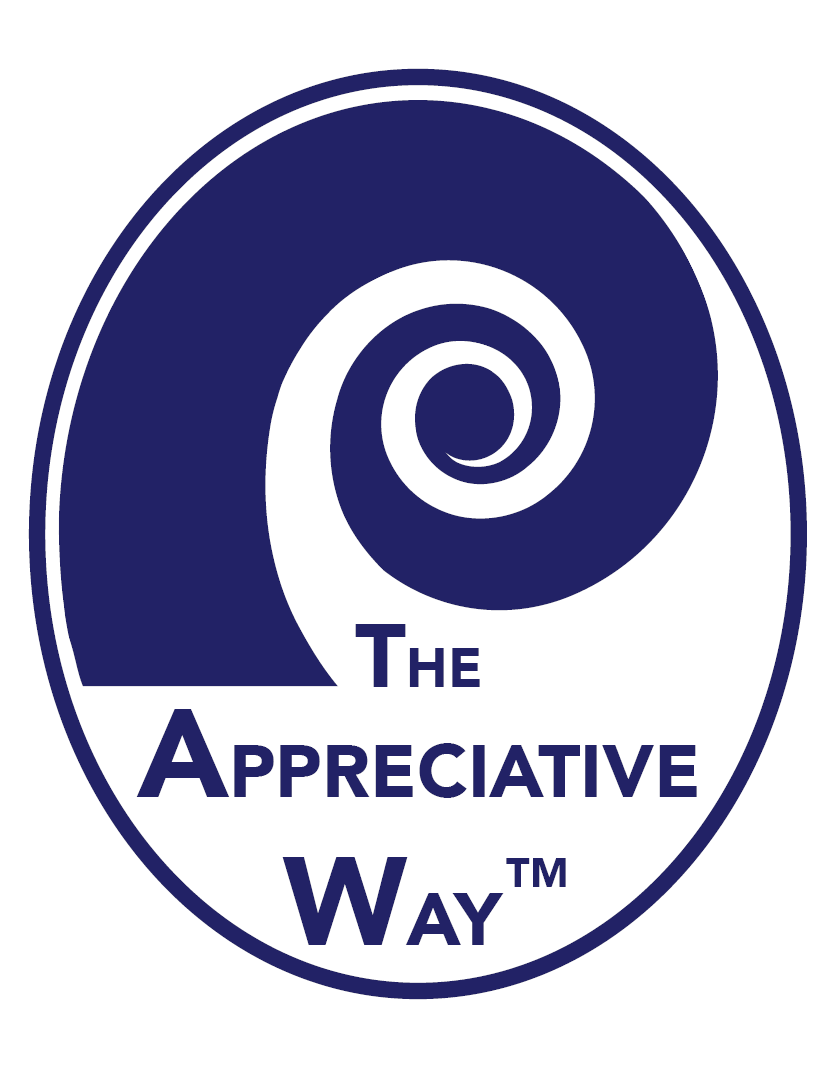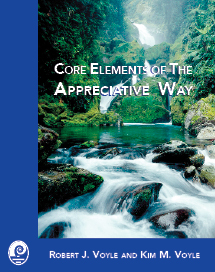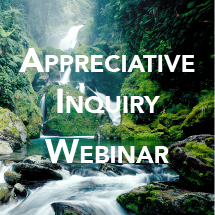

The Appreciative Way

Discover the essentials of the
Appreciative Way in this fast
read format book by
Rob and Kim Voyle.
Director of Training
- Episcopal priest
- Psychologist
- Executive Coach
Rob is an accomplished speaker and trainer. Participants consistently rate his training programs as:
"one of the best workshops
I've attended in years"
What Participants Say
Rob's training is full of heart, wit, and passion.
E.R. Executive Coach
Rob's combination of organizational savvy, teaching skills, theological & spiritual integration, and ability to rapidly build supportive, learning communities is quite simply the best in any of
the churches today.
Gray Temple, Episcopal Priest, Author & Coach
After 45 years in the pastoral ministry and attending three events led by Rob Voyle, I have finally learned a better way to help church leaders help themselves and the people they serve.
John Wilkerson, Director: Church Leadership Coaching & Consulting
Rob will enhance your ability to delight in yourself, your neighbor and God through his insightful, practical, loving, professionally grounded, appreciative and often mischievous coaching and
teaching skills; and that will make you a better leader and citizen in God's creation.
Ed Leidel, Episcopal Bishop and Congregational Coach serving North America
"I have been fully engaged emotionally, intellectually, and spiritually. Thank you for touching me at the core of my being."
M.E. Member of the UCC Church.
"Of all the training I have been to, your notes are the ones I keep coming back to time and again for practical resources."
P.W. Conference Pastor.
Rob's educational model brings body, mind and spirit together. I have been challenged intellectually, transformed spiritually, touched emotionally, gathering in communally. He came into my life at just the right time.
Jean Holmes, Presbyterian Pastor
In this webinar you will:

- Learn the fundamentals of the Appreciative Way
- Conduct an Appreciative Inquiry into your life and work
- Discover and articulate your core purpose for being
- Learn how to use the three faces of compassion
Tenderness, Fierceness, and Mischievousness
as an agent of transformation in the world - Experience and learn the art of asking powerful questions
- Synthesize what you learned to create Appreciative Strategies
to resolve resistance and lead change in your workplace
Webinar Schedule: Introduction to Appreciative Inquiry
No Introduction to Appreciative Inquiry webinars are scheduled at this time.
Please see training schedule for a complete listing of all webinar programs
Our webinar programs provide:
- 24/7 Access to online class recordings.
- Live tutorials for consultation and application.
- Individual and virtual team learning.
- Full access to workshop participant resources.
Introduction to Appreciative Inquiry: Course Schedule
Course Work: 1.5 hours of recorded online class that is completed prior to the tutorial.
The material is presented online and can be accesed at anytime during the program
Tutorial: Conference call for just-in-time consultation and group exercises.
Weekly Teleconference for 10 weeks: Check Webinar Schedule for the specific times and dates.
Course Presenter
The online content has been developed and recorded by Rob Voyle the founder of The Appreciative Way. The recorded material is available 24/7 for you to access at your convenience.
Tutorial Facilitators
Please check the Webinar Schedule for information regarding your Tutor for the live tutorial.
Course Outline
Week 1: Introduction to the Appreciative Way
The Appreciative Way.
Metaphors for our best.
The creative power and impact of positive emotion.
Week 2: Appreciative Understanding of Creating Change
Moving from problems to solutions.
Discovering the best of the past.
Discovering the root cause of success.
Week 3: Understanding Resistance
Understanding resistance as an act of wisdom.
Ensuring change is a sustainable blessing.
Seeking and satisfying objections.
Week 4: Creating Appreciative, Incarnational Relationships
Transactional Analysis model of joining.
The three faces of compassion, tenderness, fierceness, and mischievousness.
Using compassionate strategies to enable transformation.
Week 5: Assumptions of Appreciative Inquiry
The underlying assumptions of appreciative inquiry
The power of acceptance to transform lives
Going beyond being positive to discovering what is life-giving
Week 6: Models of Appreciative Development
5D spiral of development.
Locating resources on the spiral of life.
Living and working from a place of purpose and vision.
Week 7: The Power of Great Questions
Understanding the impact of questions.
Crafting interview questions.
Staying resourceful.
Week 8: Designing an Appreciative Intervention
Personal projects.
Applying the appreciative way in diverse contexts.
Next steps.
Week 9: Personal Projects
Tutorial time to focus on participants implementation of their projects.
Week 10: Personal Projects Continued
Tutorial time to focus on participants implementation of their projects.
Check Schedule and Register for Webinar
Learning Objectives
As a result of participating in this webinar participants will be able to:
- Describe the basic theory and practice of Appreciative Inquiry (AI);
- Explain the application of AI and its understanding of change dynamics which has been used to fuel innovation in organizations as diverse as GTE and Habitat for Humanity;
- Describe AI as it forms the basis as the emerging "cutting edge" approach in the organization development and coaching fields;
- Discover and use an individual client's or an organization's core strengths, passion, and purpose to create resourceful motivated states;
- Transform negative goals and problem orientations into positive goals and preferred future orientations;
- Utilize resistance to increase motivation and create sustainable outcomes;
- Develop the strategies to design powerful AI questions and conduct AI interviews to discover people at their best and most resourceful states;
- Describe the differences between linear incremental change and transformational change;
- Create and utilize confusion to provide opportunities for transformation with individuals and organizations;
- Use the three faces of compassion: tenderness, fierceness, and mischievousness as an agent of transformation in the world;
- Identify the external environmental, internal skills, and motivational resources and strengths individuals and groups possess to achieve desired outcomes;
- Use the power of an individual or group's imagination to create dreams and stretch goals that are also reality based and resourced;
- Help individuals and organization discover and articulate their core purpose and organize their goals and activities around manifesting that purpose in the world;
- Transform failure states into learning opportunities;
- Design and implement an Appreciative Inquiry Summit for large scale strategic planning and organization development;
- Design and implement a small group Appreciative Inquiry process to review past performance and empower future performance to help client's achieve their dreams;
- Shift their personal way of being and seeing to an appreciative approach, to focus on and grow what's right in the organization and their world, rather than on what's wrong;
Continuing Education Credit
This program qualifies for 20 hours of continuing education credit.
This program currently does not qualify as continuing education for psychologists.
Cost and Cancellation
Complete Tuition cost: $495 payable prior to Week 1.
Cancellation with a 15% cancellation fee may be made prior to the first week and the receipt of personal passwords.
No refunds are available after receipt of the passwords and access to the online material.
Who Should Attend This Program
Although this program is designed with clergy in mind, it would also be appropriate for anyone who can articulate and reflect psychologically and theologically on their ministry or vocation. It is especially relevant for:
- Clergy
- Non-ordained persons engaged in ministry.
- Psychologists, Consultants and Counselors.
who are also clergy or who work with clergy and churches. - People who want to reflect theologically and psychologically on the work they do.





